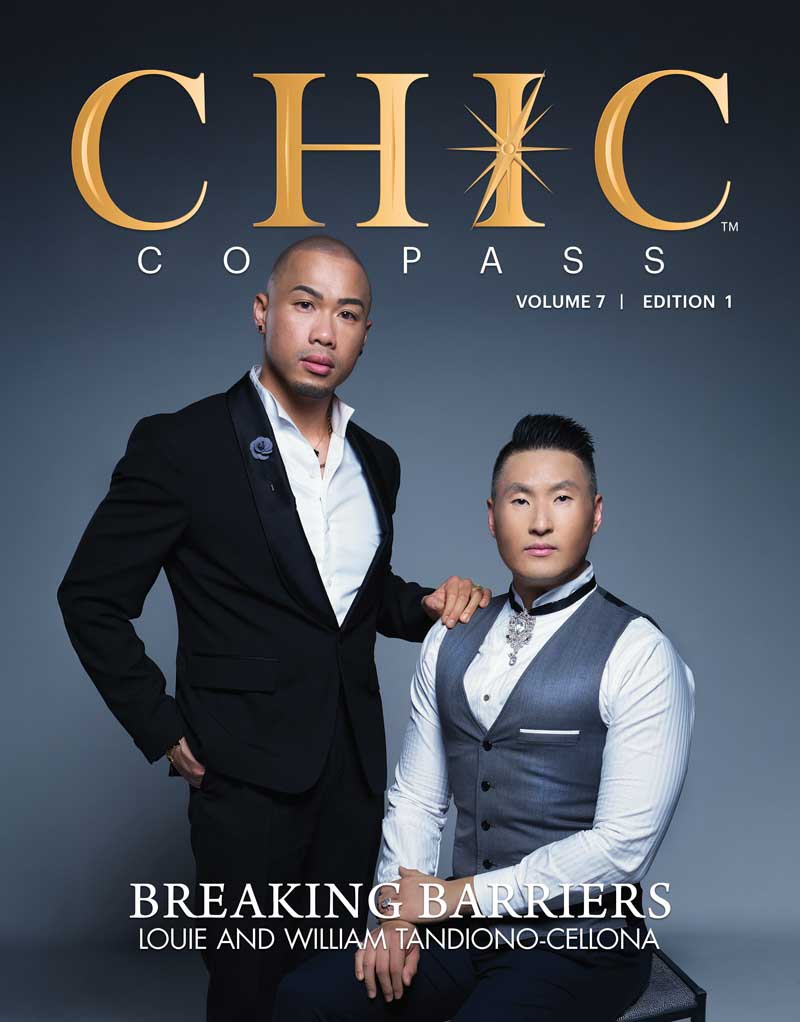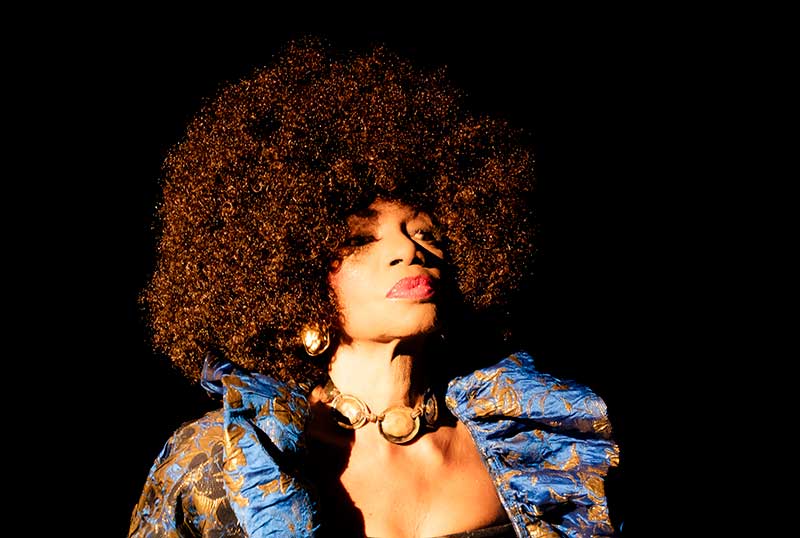
Photo of Melba Moore by Sheryl Aronson (Sasaphotos)
Melba Moore
‘I’m Still Standing’
BY SHERYL ARONSON
The lights dim in 54 Below, the iconic, plush, red-walled, cushioned-seated showroom in New York City that showcases legendary cabaret performers. Silence hushes the theater, but an anticipatory mood envelops the crowd. Suddenly, lights ignite a gorgeous, regal figure from the back, donned in a sublime turquoise and golden cape that covers a shimmering, matching blue gown.
Melba Moore looks stunning: her hair towers in a colossal Afro; her face is serene as she gazes over the audience before belting out the lyrics to “Easy to Be Hard” from “Hair.” Strutting to the stage—still magnificent after 50-plus years in the entertainment business—Moore commands the moment and tells the world, “I’m still standing!”
Born into a musical family, Moore felt it was her destiny to carry the torch of an artist. Her mother, Bonnie Davis, was a professional singer; her natural father, Teddy Hill, was a big bandleader; and her stepfather, Clement Leroy Moorman, was a jazz pianist. As a child, Moore’s life was saturated by music—piano lessons, listening to all genres and being influenced by her musical parents. She set her sights on attending Newark Arts High School and later earned a Bachelor of Arts in music from Montclair State College.
Moore’s illustrious career has been marked by groundbreaking achievements as a Black American female performer. For her role in “Purlie,” she became the first Black actress to win a Tony Award for Best Featured Actress in a Musical. She was also the first Black woman to replace a white actress (Diane Keaton) in the lead role of the Broadway musical “Hair” and the first African American woman to play the female lead in “Les Misérables” on Broadway.
In her singing career, Moore rose to the top of the charts with hits like “Falling,” “You Stepped into My Life,” “Love’s Comin’ At Ya” and “A Little Bit More.” A four-time Grammy-nominated artist, Moore has released 28 albums, appeared in 12 theater productions, acted in seven films and starred in multiple television shows. Her versatility spans genres, including R&B, soul, classical, jazz, contemporary and gospel.
Moore received a star on the Hollywood Walk of Fame on Aug. 10, 2023, and released a deluxe edition of her “Imagine” album the same year.
Although her career has reached the highest highs and faced the lowest lows, Moore remains the embodiment of a pure entertainer—a master of her craft—and her brilliance shines in every glorious note.
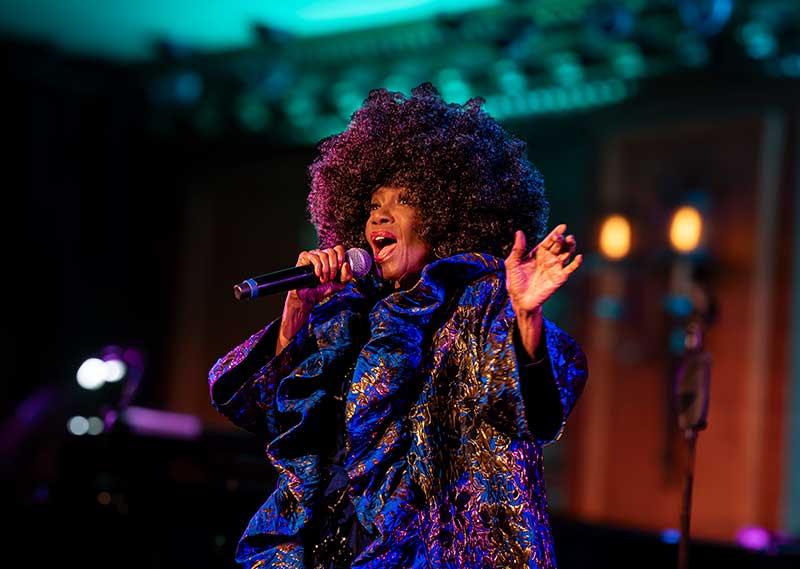
Photo of Melba Moore by Sheryl Aronson (Sasaphotos)
Chic Compass: Melba, you’re a legend and have been in the entertainment business for 50-plus years. How have you thrived in this very challenging industry?
Melba Moore: I love what I do. I’ve had a lot of help from so many people over the years. Every time I think about doing another project, whether music or theater, I’ve always had a great team around me to figure out my next project and get it done one step at a time.
Chic Compass: You grew up in a musical family. How did these influences shape your decision to become an entertainer?
Melba Moore: I’m sure it’s in my blood since my natural father, Teddy Hill, was a big bandleader, and my mother was a singer. My mother and he never married. She raised me as a single mom, and she traveled a lot; therefore, I was raised by a nanny. My mother married my stepfather when I was nine years old. I think of myself as a late starter, studying voice and piano at that age. My stepdad made all my siblings and I take piano lessons. At that point, I fell in love with music and discovered I could also sing. By high school, I was determined to make music my profession. I went to Arts High School, where I seriously began to focus on music.
Chic Compass: How did you develop your five-octave range? Was it natural, or did you have to work hard on it?
Melba Moore: I worked hard to develop my five-octave range. I was a soprano and trained as a classical vocalist. When I came out of college, I taught school for a while but was determined to become an artist who could sing R&B music. I listened to vocalists like Dionne Warwick and Aretha Franklin and began imitating their styles. If I wanted to sing R&B, I had to learn to holler and scream! I had a soft voice, so I started practicing belting out vocals. To strengthen my voice and stamina, I took dancing and swimming lessons. Over time, I built up my middle and lower ranges, which increased my power and range.
Chic Compass: You were very determined to work hard and had already learned a good work ethic. You grew up in an exciting time when rock’n’roll, R&B and disco came together in the 60s, 70s and 80s. How did you find your voice during this time? How did you develop the Melba Moore unique sound?
Melba Moore: That’s a very good question. It was quite difficult at first, and I must credit my former husband, Charles Huggins, a music producer. I had already won a Tony Award and performed on Broadway when I met him. Because of this recognition, I was invited to perform everywhere and signed my first recording contract with Mercury Records. Charles, who became my manager, helped me navigate the industry. At Buddah Records, he found songwriters who could highlight my voice, such as Van McCoy, who wrote “This Is It” for me. Later, I worked with Philadelphia International Records producers Kenny Gamble and Leon Huff and the songwriting duo McFadden & Whitehead, who produced “A Portrait of Melba.”
I started with an awkward soprano high voice and was finally building my vocal strength. Because I practiced continuously, I had incredible breath control. One day, I was working on a song, and one of these high notes popped out and carried across the room. I said, “Oh, my goodness, where did that come from?” I kept holding the note and realized it was me making the sound. Then, I kept doing it to see if I could repeat it, and I was able to add this unique skill to my repertoire.
When Gene McFadden wrote the song “Falling,” we incorporated this vocalization. Not only did the song become noteworthy for my vocal dynamics—including a high note that I held for nearly 20 seconds, ranking among the longest sustained notes in recorded pop music—but “Falling” also peaked at No. 1 on Billboard’s Hot R&B Singles chart for one week.
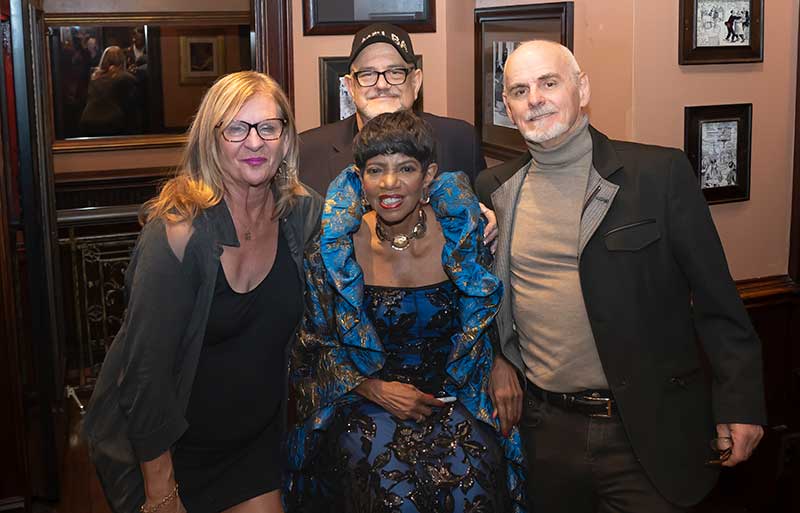
From Left: Sheryl Aronson, David Josef, Melba Moore, and Daniel Forrester, photo by Sasaphotos
Chic Compass: Let’s talk about your Broadway career. You were in the cast of “Hair.” How did you land that role?
Melba Moore: Back in the 1960s, I met Valerie Simpson, and we started chatting and exchanging numbers. Valerie told me she was a backup singer for jingles and other recording sessions. She later invited me to become a backup singer as well.
Along the way, I was invited to participate in Galt MacDermot’s recording sessions, the composer and band director of “Hair.” He recorded his version of all the music, assisted by Gerome Ragni and James Rado, who wrote the book and lyrics. The sessions lasted about two weeks.
When the sessions ended, Gerry and Jim invited everyone from the recordings to sing for the director and producers of “Hair.” They had promised to find parts for us. After hearing the recordings, the director and producers were very impressed with everyone, but I was the only one who went on to join the show. Thankfully, the director and producer liked me, and I got the part despite having no acting experience. They were looking for interesting personalities, and the director thought I had one! We were told we’d be trained for the roles.
Chic Compass: Then you played the Tony Award-winning role of Lutiebelle in “Purlie.”
Melba Moore: (Melba laughs and admits) Everybody thought I was a great actress, but I based the character of Lutiebelle on my nanny who raised me. She had been an orphan and an illiterate domestic worker. I copied her accent and mannerisms. When I tried out for “Purlie,” I didn’t have an agent. After “Hair” was over, I started looking around for something else to do. I didn’t know how to audition for theater roles, but my friend advised me not to worry and to audition anyway. After this experience, I was on the map—it threw me into television, film and the music industry.
Chic Compass: You’ve been nominated four times for a Grammy Award and have created 28 albums. What has this meant to your career?
Melba Moore: The nominations have established me as a successful recording artist, yet I’ve had to overcome many challenges in my career. I felt very honored when my cover of Aretha Franklin’s song “Lean on Me” was nominated for a Grammy. I’ve always worked very hard to develop my style. Over time, the music business has changed many times, and I’ve had to evolve with it. Now, the business is primarily small, independent artists who figure out how to grow on their own.
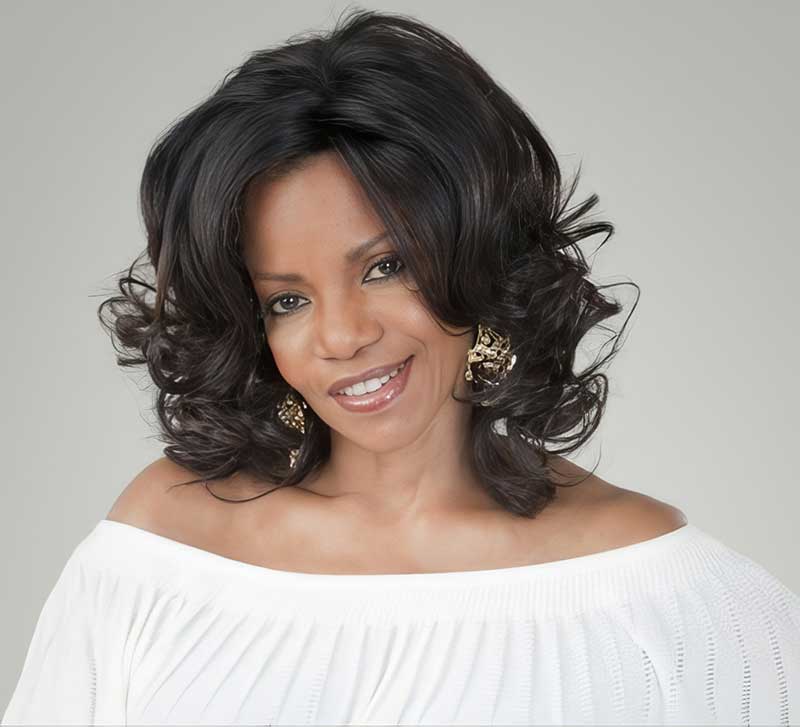
Melba Moore
Chic Compass: You’re primarily a New Yorker and love performing in the city. Talk about what New York has meant to you over the years.
Melba Moore: I’m a New Yorker at heart. I was very smart to stay in New York for cultural and spiritual reasons. I love the way that New York City is so multidimensional and multicultural. I have such a great team on my side promoting my career.
My latest album, “Imagine,” was produced by my daughter’s record label and is connecting me with the next generation. It came out in 2023 and has 12 songs. I first released two songs: “So in Love,” which spent three weeks atop the UK Soul Top 30 chart, and then we released “Take Me Away.” I feel that now I have full control over how I market myself. In the past, record companies sometimes took advantage of artists. There’s interest in creative projects for me because of the release of “Imagine” with incredible people like Richard Russell wanting to send me songs and working with Brenda Russell. She’s a New Yorker, too.
Chic Compass: Speaking of New York, I enjoyed seeing you perform last October at a sold-out house at 54 Below. What did it mean to you to perform at that illustrious venue?
Melba Moore: It’s extremely exciting to experience a solo cabaret show at this point in my career. I came up with the concept myself and wrote the script for the show. Honestly, I would have preferred having a skilled writer do it, but there wasn’t time. I didn’t know if it would work, but the show must go on!
Chic Compass: You did a great job! The audience loved your performance. Now, I also want to congratulate you on receiving a star on the Hollywood Walk of Fame. Of course, you wore a David Josef designer outfit. First, talk about getting that star.
Melba Moore: Fortunately, my manager, Ron Richardson, focused on different areas of my career that were very substantive. He had been working on this project for a couple of years, but I had so much on my plate that I wasn’t thinking about the true meaning of getting the star. Once it became a reality and he explained the meaning to me, I felt overwhelmed with gratitude. It was a culmination and recognition of the many years of hard work. I thought to myself, ‘I’m now permanent here.’
Chic Compass: You’ve had such a vibrant, successful and versatile career. This honor was well deserved. Now, talk about David and the special outfits he creates for your shows and awards ceremonies.
Melba Moore: Everything that David has made is a one-of-a-kind outfit. He’s developed a way of styling me so that when people see me, they say, ‘OMG, look how great she looks.’ That’s the art of being a great designer. The design doesn’t overshadow me. He’s an artist and extremely creative. I love the incredible fabrics, and his capes are ridiculously stunning. He knows what the fabric will do to the natural eye on the stage and at a distance when the colored lights hit them. They take on a whole life of their own.
Chic Compass: You wear all the outfits like a queen.
Melba Moore: David helps me bring my train off the cape so I can turn around and flop it onstage or on the red carpet—wherever I wear one of his special designs.

Melba Moore
Chic Compass: In January, you performed with the fabulous Kenny Lattimore in the gospel show “Heavenbound” in Los Angeles. What was that like?
Melba Moore: I didn’t do an acting role. Don B. Welch, the show’s producer, invited me to sing two songs. I was excited, however, to be working with Kenny Lattimore. Here’s what’s interesting, though … one of the things that saved me when my career crashed was that I went on my first gospel musical tour.
I had lost everything and was homeless. Michael Matthews, the godfather of gospel music theater, cast me in his production. I left just in time to avoid being evicted from my apartment. I became a born-again Christian. I didn’t have an address or a bank account. I got paid in cash and saved $7,000 at the end of the first week. After two years of being on tour with the show, I could afford a high-rise apartment just off the Hudson River on the Jersey side. From that experience, I do my business differently now.
Chic Compass: I love that story because many people don’t understand how much an artist can struggle. You reinvented yourself from your struggles.
Melba Moore: Michael calling me and putting me in his show was God’s blessing. I didn’t know anything about gospel plays. They were starting to become a form of theater around the country. That’s why I can still look forward to having a future in this industry, even though I’ve already been in it for 50 years.
Chic Compass: This brings us to the conclusion of the interview. What has it meant to you to be in the business all these years, and what can your fans expect as you move forward?
Melba Moore: I still have glamour, wisdom, health and a calendar of shows. Maybe I can show others what they, too, could look forward to in life. I will write a book and do some documentaries so I can document from my own perspective what my life and career have been. I don’t want to work as hard and want to be more selective. But in the end, keep it moving.

